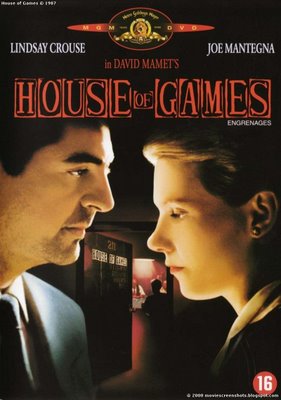
HOUSE OF GAMES
US, 1987, 102 minutes, Colour.
Lindsay Crouse, Joe Mantegna, Mike Nussbaum, Lilia Skala, Ricky Jay, J. T. Walsh.
Directed by David Mamet.
House of Games is the directorial debut of Pulitzer Prize-winner David Mamet. His previous screenplays include The Postman Always Rings Twice, The Verdict, The Untouchables, Glengarry Glen Ross. A film was made of his play, Sexual Perversities in Chicago, as About Last Night.
House of Games is excellent. A psychologist, serious and hard-working, played by Mamet's wife, Lindsay Crouse, becomes involved, because of a client, with a conman. Fascinated, she wants to know how he plays his games and why, until she is enmeshed and cannot get out. The film is seen as a film noir, though masculine and feminine roles reversed.
The plot has many unexpected twists that are to do with confidence and confidence tricksterism. They are tightly-written and acted and always fascinating. Lindsay Crouse is excellent in her studied manner as the psychologist; Joe Mantegna (Compromising Positions, Suspect) is the conman. The screenplay links the psychologist’s work with her behaviour and explores the wilfulness and waywardness of human nature.
1. Psychological thriller and drama? Of confidence, confidence tricksterism and gambling? The American way?
2. The use of the city of Seattle, hospitals, prisons, homes, the house of games, hotels, the streets? The musical score and mood?
3. David Mamet's plays and screenplays? His skilled writing? Director’s debut? Working with his wife?
4. The introduction to Margaret Ford: her appearance, the professional woman, buttoned up and tight, her book and its title, 'Driven', and its reference to obsessions and compulsion? Her views on controlling of life? being
asked to sign the book, her being a help to people? With her doctor friend and her hurry, clothes, smoking? (And the contrast in the same restaurant with the uptight woman at the other table, from whom she stole the lighter?), her being hassled? Her tone of voice - elegant and deadpan? her Freudian slips in conversation about pressures? Her manner of counselling, taking real notes, feeding back material to the clients? The embracing of the girl in prison? The girl and her dreams and Margaret identifying with these? Billy and her taking the gun, the IOU? Audience reaction to this driven psychiatrist?
5. Margaret as a character, living alone, doing good? The hints about her father and his condemnation of her? The suggestions of lack of control and passion underneath the rigid surface? Her decision to go to the House of Games? The adventure, the fascination? The encounter with Mike, the set-up for the end game? Her participation? Her being tricked into signing the cheque and her seeing the dripping water pistol, the explanation? her fascination with Mike, returning to the scene of the games?
6. Her talking with the doctor, the doctor's theory of forgiving self and having joy in life? Confidence tricksterism by the psychologist or sound advice?
7. Her finding Mike, her proposing to write a book, the going to the hotel and the black going out, their taking his room? The sexual encounter? Taking the knife as a souvenir? The set-up of the scheme and its timing?
Her wanting to participate in it? Audiences identifying? Her already being taken in by lies?
8. The set-up, the card man and the taxi, the leaving of the case with the money? The man from the meeting and Joey with the set-up? Going to the hotel, passing the night arguing? Talk, her overhearing the police connection in the bathroom? The struggle and the shooting? Her offering the $30,000? her taking the car, the escape, the plan? The effect on her, shattering her calm, cleaning up her office, breaking the glass and hurting herself, Billy's cancelling his appointment? Her wanting to talk with her doctor friend outside the lecture room? Taking the rubbish out and seeing Billy in the car? The truth dawning? The audience being tricked?
9. Her going to the bar, overhearing the whole plan, her being mocked, hearing the truth about herself, referred to as a whore and an addict? Her decision for vengeance, going to the airport, the calm confrontation of Mike, her setting him up, her shooting him? His not begging and her relentlessness?
10. Margaret at the end, having a meal with her doctor friend who was called to the phone, the colourful dress - her having forgiven herself? The confidence trick on herself? Responsibility?
11. The picturing of the stings and their consequence? The audience conned? The demonstrations of how the cons worked, audiences being led on, the play on gullibility?
12. Mike and his personality, in action, with Margaret, tender, explaining the schemes, sincerity, the irony when Margaret overheard him, in the airport, the confrontation and his not begging as he was shot?
13. Joey and his participation, acting his role well - the fine detail of the trick with the case, the money, the mob, the car, nervousness? The rest of the group? Professional criminals and conmen?
14. Themes of human nature, confidence and gullibility, behaviour? The psychological implications?